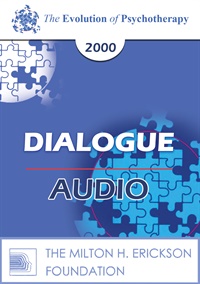
- Average Rating:
- Not yet rated
- Topic Areas:
- Psychotherapy | Dialogues | Brief Therapy
- Categories:
- Evolution of Psychotherapy | Evolution of Psychotherapy 2000
- Faculty:
- Mary Goulding, MSW | Arnold Lazarus, Ph.D.
- Duration:
- 56 Minutes
- Format:
- Audio Only
- Original Program Date:
- May 28, 2000
- Short Description:
- EP00 Dialogue 11 - Making Therapy Brief - Mary Goulding, M.S.W., and Arnold Lazarus, Ph.D. Given a topic, to become aware of the differing approaches to psychotherapy, and to identify the strengths and weaknesses in each approach. Featuring Mary Goulding, M.S.W., and Arnold Lazarus, Ph.D., moderated by Brent Geary, Ph.D.
- Price:
- $15.00 - Base Price
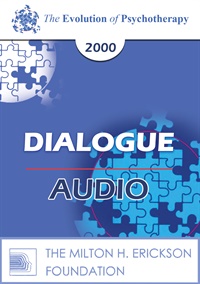
- Average Rating:
- Not yet rated
- Topic Areas:
- Psychotherapy | Dialogues | Neuroscience
- Categories:
- Evolution of Psychotherapy | Evolution of Psychotherapy 2000
- Faculty:
- Judd Marmor | Ernest Rossi, PhD
- Duration:
- 59 Minutes
- Format:
- Audio Only
- Original Program Date:
- May 28, 2000
- Short Description:
- EP00 Dialogue 12 - Facilitating Neurogenesis in Psychotherapy - Judd Marmor, M.D., and Ernest Rossi, Ph.D. Given a topic, to become aware of the differing approaches to psychotherapy, and to identify the strengths and weaknesses in each approach.
- Price:
- $15.00 - Base Price
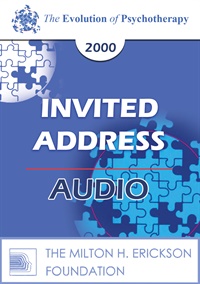
- Average Rating:
- Not yet rated
- Topic Areas:
- Invited Addresses | Social Issues | Psychotherapy | Therapist Development
- Categories:
- Evolution of Psychotherapy | Evolution of Psychotherapy 2000
- Faculty:
- Jay Haley, MA | Arnold Lazarus, Ph.D.
- Duration:
- 1 Hour 16 Minutes
- Format:
- Audio Only
- Original Program Date:
- May 29, 2000
- Short Description:
- Often meetings on therapy focus on differences among therapists; overlooked is what they have in common. Basic ideas are hidden in social and political actions.
- Price:
- $15.00 - Base Price
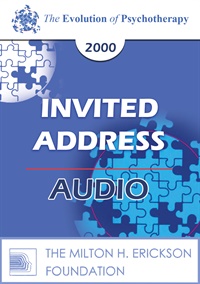
- Average Rating:
- Not yet rated
- Topic Areas:
- Invited Addresses | Therapist Development | Psychotherapy
- Categories:
- Evolution of Psychotherapy | Evolution of Psychotherapy 2000
- Faculty:
- Jeffrey Zeig, PhD | Erving Polster, PhD
- Duration:
- 1 Hour 27 Minutes
- Format:
- Audio Only
- Original Program Date:
- May 29, 2000
- Short Description:
- Therapy promotes "movement." To facilitate movement the therapist can assume therapeutic "postures." These postures are a font from which interventions follow.
- Price:
- $15.00 - Base Price
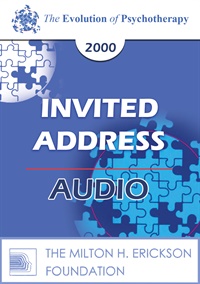
- Average Rating:
- Not yet rated
- Topic Areas:
- Invited Addresses | Existential Therapy | Psychotherapy
- Categories:
- Evolution of Psychotherapy | Evolution of Psychotherapy 2000
- Faculty:
- Irvin Yalom, PhD | Cloe Madanes, HDL, LIC
- Duration:
- 1 Hour 28 Minutes
- Format:
- Audio Only
- Original Program Date:
- May 29, 2000
- Short Description:
- Dr. Yalom will discuss the definition of existential psychotherapy, its sources, basic tenets and applications in clinical work. Major focus will be on the ultimate concerns of death, meaninglessness, freedom and isolation. Dr. Yalom will discuss his approach to teaching about this field through a literary conveyance.
- Price:
- $15.00 - Base Price
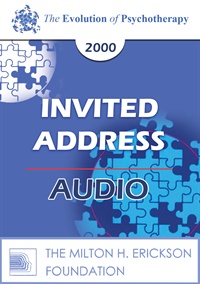
- Average Rating:
- Not yet rated
- Topic Areas:
- Invited Addresses | Psychotherapy
- Categories:
- Evolution of Psychotherapy | Evolution of Psychotherapy 2000
- Faculty:
- Paul Watzlawick, PhD | Zerka Moreno
- Duration:
- 1 Hour 26 Minutes
- Format:
- Audio Only
- Original Program Date:
- May 29, 2000
- Short Description:
- EP00 Invited Address 11b - Therapy of "As If" - Paul Watzlawick, Ph.D. Certain aspects of language can be especially useful for the purpose of bringing about behavioral changes. The nature of these changes is best known, but by no means limited to, its hypnotherapeutic application. They are, for instance, "corrective emotional experiences," as defined by Franz Alexander. Long before Alexander, the philosopher Hans Vaihinger, in his famous work, "The Philosophy of As If" (1911 ), had investigated in great detail the fact to behave "as if something were the case, could bring about almost immediate changes in given contexts.
- Price:
- $15.00 - Base Price
Tags: Paul Watzlawick Psychotherapy
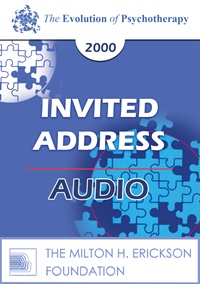
- Average Rating:
- Not yet rated
- Topic Areas:
- Psychotherapy | Invited Addresses | Narcissism | Personality Disorders | Psychoanalysis | Object Relations Theory
- Categories:
- Evolution of Psychotherapy | Evolution of Psychotherapy 2000
- Faculty:
- James F. Masterson, MD | James Hillman, PhD
- Duration:
- 1 Hour 19 Minutes
- Format:
- Audio Only
- Original Program Date:
- May 29, 2000
- Short Description:
- In this paper, Dr. Masterson gives an understanding of the intrapsychic structure of Narcissistic Personality Disorder and how it finds clinical expression through the disorders of the self triad. Clinical cases are presented to illustrate how the therapeutic intervention of mirroring interpretation of narcissistic vulnerability helps the patient to convert transference acting-out to therapeutic alliance and transference, thereby creating the condition for psychoanalytic psychotherapy.
- Price:
- $15.00 - Base Price
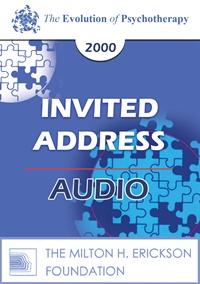
- Average Rating:
- Not yet rated
- Topic Areas:
- Invited Addresses | Psychotherapy | History of Psychotherapy | Psychoanalysis
- Categories:
- Evolution of Psychotherapy | Evolution of Psychotherapy 2000
- Faculty:
- Judd Marmor | James Bugental, PhD
- Duration:
- 1 Hour 28 Minutes
- Format:
- Audio Only
- Original Program Date:
- May 29, 2000
- Short Description:
- This address is a review of the significant theoretical and practical changes in the practice of psychoanalytically-oriented psychotherapy in the experience of the author's personal practice over the past 62 years.
- Price:
- $15.00 - Base Price
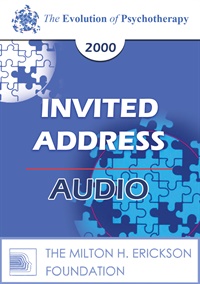
- Average Rating:
- Not yet rated
- Topic Areas:
- Psychotherapy | Invited Addresses | Law & Ethics | Transference Focused Psychotherapy (TFP)
- Categories:
- Evolution of Psychotherapy | Evolution of Psychotherapy 2000
- Faculty:
- Arnold Lazarus, Ph.D. | Michael White, B.A.S.W.
- Duration:
- 1 Hour 27 Minutes
- Format:
- Audio Only
- Original Program Date:
- May 25, 2000
- Short Description:
- This presentation will summarize the strategy, tactics and techniques of TFP (Transference Focused Psychotherapy), its indications and contraindications, process and outcome studies of the Cornell University Personality Disorders Institute that developed this treatment over the past 15 years.
- Price:
- $15.00 - Base Price
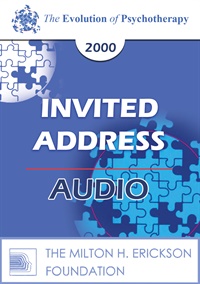
- Average Rating:
- Not yet rated
- Topic Areas:
- Psychotherapy | Invited Addresses | Therapist Development
- Categories:
- Evolution of Psychotherapy | Evolution of Psychotherapy 2000
- Faculty:
- Donald Meichenbaum, PhD | Jay Haley, MA
- Duration:
- 1 Hour 31 Minutes
- Format:
- Audio Only
- Original Program Date:
- May 25, 2000
- Short Description:
- Based on a review of the psychotherapy literature, seven core tasks that psychotherapists need to include and five additional core tasks of psychotherapy for patients with a history of victimization have been identified. A case conceptualization model and treatment guidelines on how to become a more effective psychotherapist will be offered.
- Price:
- $15.00 - Base Price
Please wait ...

